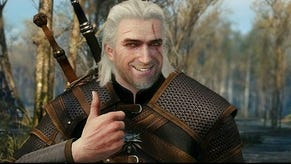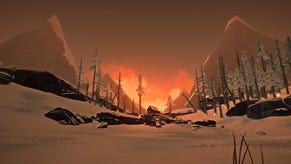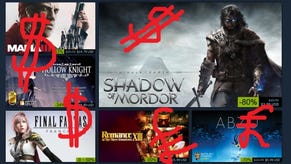Deadly Premonition is the game worth saving from 2013
Who needs Twin Peaks S3
Every game released before 2015 is being destroyed. We only have time to rescue one game from each year. Not those you’ve played to death, or the classics that the industry has already learned from. We’re going to select the games that still have more to give. These are the Saved Games.
Deadly Premonition, in many respects, is one of the worst games I’ve ever played. The combat is awful, with a three-button aiming system and melee weapons that break after four swings. The sound design essentially consists of the same four or five audio clips on loop for the 25-hour story (I’d recognise that door creak anywhere). The driving is shocking, some of the acting is straight out of your local am-dram class, and the graphics wouldn’t look out of place on something released 15 years prior. To top it all off, the PC port is locked to 720p. Glorious.
So why on earth would I choose it as the game I’d save from 2013 (or 2010 if you count the game’s initial console release)?
The first is its protagonist, FBI Agent Francis York Morgan. “But please, call me York. That's what everyone calls me.” He’s one of my favourite characters in gaming. He has an imaginary alter-ego called Zach, who he talks to about the clues he finds while piecing together the murder of a young girl, Anna, in the small US town of Greenvale.
Essentially, that means he talks directly to you the player, making you feel more involved in the story than most games can manage. Right Zach? It also opens the door to some great fourth-wall breaking monologues. He loves chatting to Zach about 80s’ films, discussing Deadly Spawn and its “delicious B movie clichés” on long, tedious drives (I wonder what he’s getting at?), or mulling the “inter-dependency and sadism” of Tom and Jerry cartoons.
The split personality trope has been done to death but using it as a tool for humour as well as a plot device later is a nice take. A few hours in, after calling a meeting of the townsfolk, he meets Quint Dunn, an employee at the SWERY 65' darts bar. “How do you know my name?” Quint asks. “FBI stuff,” says York, or words to that effect, before turning to the camera. “Okay, Zach. I’ll tell you how I knew his name. He’s got a small Q on his hat. And that was the only name beginning with Q I could think of.”
To be straight, he’s pretty much Special Agent Dale Cooper from Twin Peaks. It’s not even subtle. Just like Cooper, he loves coffee – he reads his fortune in the milk in the mornings – he takes the strange dreams he has as fact, and he’s got a constant internal monologue through Zach, similar to Cooper’s tape recorder. It’s been criticised for being too obvious a rip-off but I’m not bothered. If you’re going to ape a TV show, it might as well be Twin Peaks. (As an aside, the similarities were actually toned down in development – originally the game was called Rainy Wood and featured characters that looked practically the same as their Twin Peaks counterparts. Now you know.)
York is also the conduit for one of the game’s other great strengths: its love of the surreal. I’m no fan of games being weird for weird’s sake, but Deadly Premonition bathes so deeply in the bizarre that you can’t help but admire it. The game alternates between York’s dreams, his reality and his hallucinations so quickly that it’s hard to keep track of exactly which dimension you’re in.
Even when you’re firmly in reality, the scenarios that the small town throws up are ludicrous: early on you’re in a hotel (the only guest) eating eggs and bacon with the hotel manager, the two of you sitting at either end of a huge dining table big enough for 16 making conversation in raised voices.
Some of it appears to have no real impact on the plot, but it all serves to create an environment where you’re not quite sure who, or what, to trust. Are the weird limbo-ing zombies you see real, or not? What about those two angels? Or those red tendrils snaking up the wall? You’ve really got no choice but to suspend belief, strap in and enjoy the ride.
And what a ride it is: twisting, sprawling, supernatural, stop-start at times, but always interesting. The plot is what ties the whole game together and keeps you moving forward, even while you’re distracted with shedloads of interesting side quests and light RPG elements (make sure you keep your suit clean, or you’ll be fined).
What makes it so engaging is not just that it’s imaginative and well-written – it’s the connection you build with the characters. There’s roughly six hours of cutscenes, which is a lot, and you really get to know the key players.
The game gets progressively darker, introducing a man sexually abusing his work colleagues behind closed doors, gas that fires people into a frenzy, and trees that grow inside people’s stomachs, all leading up to an unexpected, ambiguous ending. Even after playing it a few times and watching a stitched together movie of all the game’s cut scenes, I still don’t know exactly what to make of it, and its meaning is debated in forums to this day (in fact, I might start a spoiler discussion thread in the forum – join me there after reading this!).
Perhaps the most important reason I’d save Deadly Premonition is that it gets better the second and third time you play it. You start noticing connections that you missed the first-time round – the kind of thing that happens in a great movie or TV show (such as, I don’t know, Twin Peaks).
You understand the significance of what Harry, the old man in a gasmask that owns half the town and only speaks in riddles, says to you. You pick up on clues you missed, like the tattoo on Thomas’s back. You notice the fourth wall breaks, the foreshadowing, you read extra significance into the things that Sherriff George Woodman says, and it only deepens your appreciation for the game.
Somewhere along the road people seem to have decided that Deadly Premonition “is so bad it’s good”. Let me tell you: they’re wrong. People love it because it has certain components that are downright excellent. To me, and to many others, those components are the ones that matter. Gameplay mechanics come and go, but stories and characters will live on. And so will Deadly Premonition, now that I’ve saved it.













